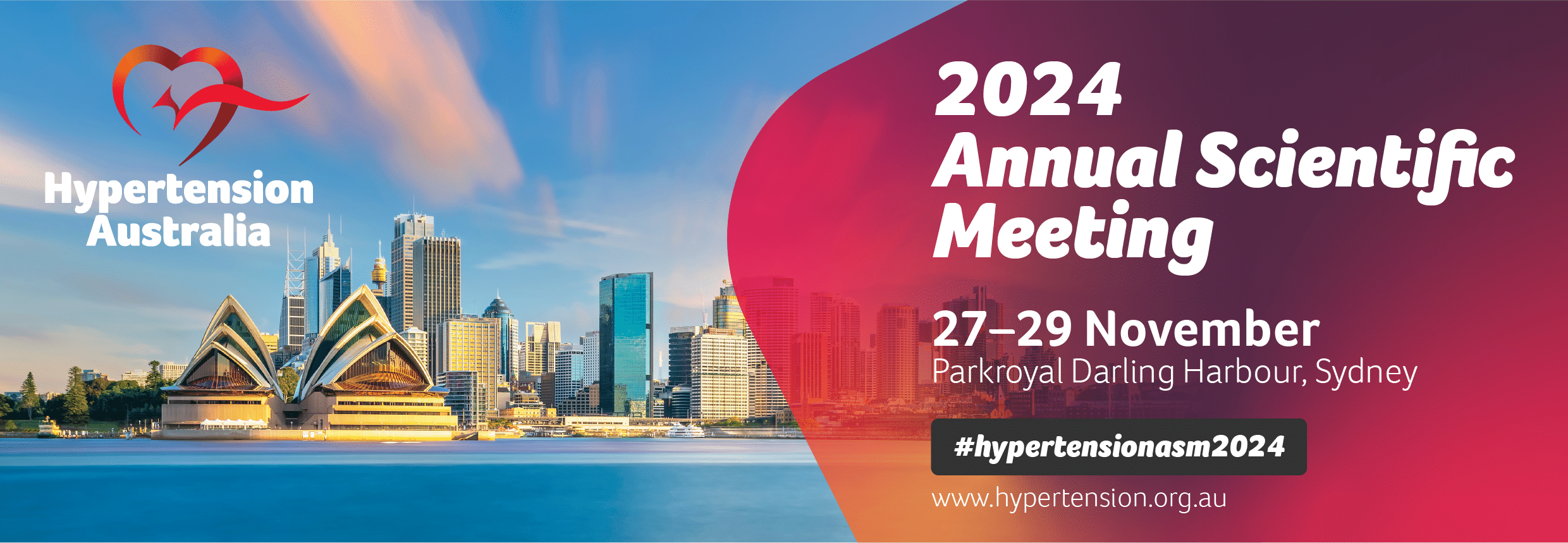
Thank you for attending
On behalf of the ASM organising committee, we thank you for attending the Hypertension Australia ASM from Wednesday 27 – Friday 29 November 2024 at PARKROYAL Daring Harbour, Sydney, Australia.
We hope you found the ASM both professionally and personally rewarding.
Prof. Markus Schlaich
President
Hypertension Australia Ltd
On behalf of the organising committee and Hypertension Australia, we are delighted to invite you to the Hypertension Australia 2024 Annual Scientific Meeting (ASM). This premier event will take place from 27 – 29 November at the PARKROYAL Darling Harbour in Sydney.
The ASM aims to unite over 100 esteemed Australian and international experts who are at the forefront of advancing preventive measures, early detection, and effective control strategies for hypertension and its associated complications. This gathering will serve as a platform for interdisciplinary collaboration, fostering the exchange of cutting-edge knowledge and innovative approaches to combat this pressing health concern.
The ASM provides a unique opportunity for members and students to present their latest research findings, with dedicated sessions and prestigious awards recognising outstanding contributions from students, young investigators, mid-career scientists, and senior researchers.
Why should you attend?
- Gain access to the latest research and advancements in hypertension prevention, detection, and management from global experts.
- Learn about the latest exciting fundamental research in hypertension and associated complications.
- Engage in valuable networking opportunities and explore potential collaborations with esteemed clinicians, researchers, and academics from Australia and around the world.
- Discover emerging techniques and cutting-edge approaches in hypertension and cardiovascular health through interactive discussions.
- Position yourself at the forefront of the field and contribute to driving positive change in patient outcomes.
- Members and students: Showcase your research findings and be recognized for your exceptional work.
- Lots of awards available for eligible members.
Sponsorship opportunities
We extend a warm invitation to organisations offering services, products, and expertise related to hypertension and cardiovascular health to support this valuable event. A range of sponsorship opportunities tailored for organisations of all sizes are available, designed to increase your brand awareness and visibility among a highly targeted audience of industry professionals.
We look forward to welcoming you to the Hypertension Australia 2024 ASM in Sydney, where we will collectively advance our understanding and impact in the fight against hypertension and its associated complications.
Prof. Markus Schlaich
President
Hypertension Australia Ltd
Hypertension Australia ASM
2024 ASM Key Dates
27 May
Registration opens and call for abstracts
8 SEPTEMBER
Abstract submission deadline
30 September
Early bird registration deadline
21 October
Accommodation booking deadline
27 November
ASM begins
Guest Speakers

RD Wright Lecturer: Professor Richard McManus
Professor of Primary Care Research, Nuffield Department of Primary Care Health Sciences, Oxford University, UK.
Richard McManus held four consecutive NHS/NIHR National Research Fellowships (DRF-Professorship, 2001-18) and was awarded an NIHR Senior Investigator Award in 2019. His main research interests are in the prevention of cardiovascular disease including following hypertensive pregnancy, in the context of multiple long-term conditions and when deprescribing may be appropriate. He is Chief Investigator on an NIHR Programme Grant around Postnatal Self-Management of Blood Pressure following Pregnancy Hypertension and leads the self-management theme of the Oxford Thames Valley ARC. He is joint Chief Investigator of the OPTIMISE2 study assessing deprescribing antihypertensives in the over 75s. He is recognised internationally for his work on self-monitoring and self-management of hypertension and leads a consortium curating 25 datasets which form an individual patient data meta-analysis of self-monitoring of hypertension. He chairs the Blood Pressure Monitoring Working Party of the British Hypertension Society and has provided expert advice to NICE (2011 & 2019 Hypertension Guideline) and the European Society of Cardiology/European Society of Hypertension (2018 & 2024 European Hypertension Guidelines). He leads Oxford’s input into the School for Primary Care Research and chairs the NIHR Research Professors Selection Panel. He is chair of the PROMPPT programme steering committee and is a member of the NIHR Programme Grants for Applied Health Research Panel.

Colin I Johnston Lecturer: A/Professor Jun Yang
Hudson Institute of Medical Research, Clayton VIC.
Associate Professor Jun Yang (MBBS, PhD, FRACP) is a clinician-researcher who heads the Endocrine Hypertension Group at Hudson Institute of Medical Research. She is also a Research Fellow in the School of Clinical Sciences at Monash University and a Consultant Endocrinologist at Monash Health. Since graduating with a MBBS (Hons, rank number 1) from Monash University, she has been actively involved in basic and clinical research as well as clinical practice. She undertook PhD studies with Dr Morag Young, Dr Colin Clyne and Professor Peter Fuller at Prince Henry’s Institute of Medical Research, now Hudson Institute, from 2008-2013. Her PhD thesis, entitled ‘Mineralocorticoid receptors (MR): mechanisms of ligand- and tissue-specific activation’, identified and characterised novel coregulators of the MR using a novel phage display technique in addition to cell culture work and gene expression assays. In addition to laboratory-based research, A/Prof Yang established the Endocrine Hypertension Service at Monash Health and Hudson Institute with Professor Peter Fuller. She developed the Monash Health guidelines for the management of primary aldosteronism (PA) in 2010 and has since expanded the PA research program including collaborations with centres in America as a part of the American-Asian-Australian-Adrenal- Alliance (A5), Europe (Germany, Italy, Netherlands) and Asia (China, Taiwan). In December 2018, A/Prof Yang formed the Primary Aldosteronism Centre of Excellence (PACE) to consolidate the capabilities of a team of dedicated hypertension researchers within Australia to drive impactful change in the clinical management of PA.
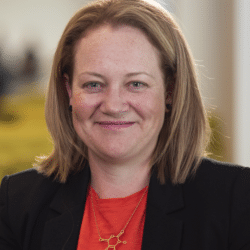
Austin Doyle Lecturer: A/Professor Nikola Bowden
University of Newcastle, Newcastle NSW.
Awarding-winning molecular biologist Associate Professor Nikola Bowden is giving existing cancer drugs new life by combining them in unconventional ways with exciting results. Over the years, the process of finding new cancer drug treatments has followed a strict pathway: the research reveals a biological discovery, which leads to a new drug discovery, drug development and testing through multiple stages of clinical trials. The problem is, this entire process can take 15-20 years to complete. Which means that a patient who is diagnosed with aggressive cancer today will be unlikely to benefit from the most recent biological discoveries and subsequent treatments. “We need to rethink our conventional approach to cancer research,” asserts Associate Professor Nikola Bowden, whose research focuses on repurposing existing cancer drugs. “We are wasting years of research and knowledge by shelving old drugs and trying to always find new ones.” Instead of focusing on creating new drugs, Nikola and her team are looking at how existing drugs can be used in new ways. For cancer patients who need more immediate solutions, her work is having a meaningful impact. “Using current drugs in new ways is called drug repurposing. We know so much about safety, dosing and side effects of the drugs we already use, it is ideal to also see if they have anti-cancer activity. We need to start using the drugs we already have to their full potential.

Prof Clara Chow, University of Sydney
Role of Digital Health in Hypertension Management
Professor Clara Chow is a cardiologist committed to reducing the burden of cardiovascular disease through prevention and innovative approaches to achieve this. She is Program Director Community Based Cardiac Services, Westmead Hospital and Professor of Medicine, Western Clinical School, Sydney Medical School, University of Sydney. She has a PhD in Medicine from the University of Sydney and completed a postdoc in Cardiovascular epidemiology and clinical trials at McMaster University, Canada. Clara holds a Career Development Fellowship of the NHMRC co-funded by the National Heart Foundation. She has over 100 publications, focused on clinical and community approaches to cardiovascular prevention and including papers in leading international journals. She led the initial TEXT ME trial that showed text messaging programs were effective in lowering cholesterol, blood pressure and weight in patients with coronary heart disease.
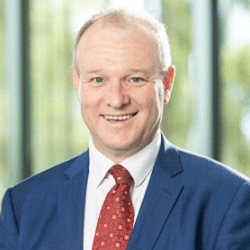
Prof Stephen Nicholls, Director of Victorian Heart Hospital, Monash Heart & ICU, Monash Health
Lipid Management in High-Risk Populations
Professor Steve Nicholls is the inaugural Director of the Victorian Heart Institute and a Professor of Cardiology at Monash University. He is the inaugural Director of the Victorian Heart Hospital which opened in February 2023. Steve is a preventive cardiologist. His clinical interest is focused on identifying those at risk of heart disease earlier, and more effectively, and preventing catastrophic cardiovascular events from occurring. He is committed to solutions which improve equity across risk and management, focusing on women’s heart health and other under-served populations. His work spans the translational spectrum from the lab bench to the bedside, with a focus on understanding the factors that promote plaque formation, novel vascular imaging and leadership of large-scale clinical trials of new therapies designed to reduce the risk of heart disease. Professor Nicholls is the 2023 recipient of the Anitschkow Prize from the European Atherosclerosis Society. He is Chair of the Asia Pacific Cardiometabolic Consortium, President of the Cardiac Society of Australia and New Zealand and a Fellow of the Australian Academy of Health and Medical Sciences.

Prof Richard O’Brien, University of Melbourne
Diabetes and Hypertension – What’s new?
After completing undergraduate training at the Austin Hospital in Melbourne, Richard O’Brien undertook further studies in diabetic renal disease with Prof. George Jerums, completing a PhD entitled “Diabetic Nephropathy: Early Pathophysiology and Therapeutic Intervention”. He continued his research at the Austin Hospital until 1991 when he moved to Monash Medical Centre. Prof. O’Brien spent 15 years as Head of Diabetes at Monash Medical Centre and moved back to the Austin Hospital in 2007 to take up his current position of Clinical Dean.
Over the last 10 years Prof O’Brien’s research work has focused mainly on aspects of atherosclerosis in diabetes including lipid abnormalities and endothelial dysfunction and he has authored numerous scientific papers on these subjects.
Richard O’Brien is the current President of the Asian Pacific Society of Atherosclerosis and Vascular Diseases and is a past President of the Australian Atherosclerosis Society. He is also currently chair of the Australian Diabetes Society’s Lipid Guidelines Committee, is the convener of the Victorian Lipid Group, and is the Victorian representative on the Australian Atherosclerosis Society Clinical Council.
In addition to his responsibilities in his role as Clinical Dean, Richard O’Brien is strongly committed to post graduate teaching, and has a long-standing interest in continuing education for general practitioners. He is frequently invited to speak at educational and scientific meetings in Australia and overseas. Prof. O’Brien also continues to be involved in direct patient care on a day to day basis and maintains ongoing research interests at the University of Melbourne and Austin Health.

Prof Alta Schutte, University of New South Wales
Update on the National Hypertension Taskforce
Alta (Aletta E.) Schutte PhD, FESC, FRRSAf, ISHF is SHARP Professor and Principal Theme Lead of Cardiac, Vascular and Metabolic Medicine in the Faculty of Medicine and Health at UNSW Sydney, Australia; with a joint appointment as Professorial Fellow at the George Institute for Global Health. She has extensive experience in working in population-based studies with a focus on raised blood pressure, hypertension and cardiovascular disease.
She has vast experience in working in the field of hypertension and cardiovascular disease within Africa, but also as part of global projects. She has been the Chief Investigator of several multidisciplinary studies (POWIRS, SAfrEIC, African-PREDICT, co-PI of the South African leg of the PURE study), published ~400 papers in the field of blood pressure and cardiovascular disease, and supervised over 85 postgraduate students.
She is Co-lead of the National Hypertension Taskforce launched in December 2022 aimed at improving hypertension control rates in Australia from currently 32% to more than 70% by 2030.
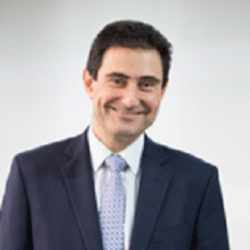
Prof Jonathan Shaw, Baker Heart & Diabetes Institute
Novel approaches to reduce cardiometabolic risk
Professor Jonathan Shaw underwent his clinical and research training in the UK. He is Deputy Director (Clinical and Population Health) at Melbourne’s Baker Heart and Diabetes Institute, where his research focuses on epidemiology and clinical research in diabetes, and he is also a consultant physician in the diabetes services.
He has authored over 500 peer-reviewed scientific papers and 35 book chapters. He is the Chair of the Diabetes Advisory Group to the Australian Institute of Health and Welfare, Council member of the Australian Diabetes Society, and a Past-President of the International Diabetes Epidemiology Group. His awards include the global Novartis Diabetes Award (for research) (2006), the International Diabetes Epidemiology Group Peter Bennett award (2011), the Australian Diabetes Society’s Jeff Flack Diabetes Data award (2015), and the Australian Diabetes Society’s Kellion award (2018).
In 2014, he was included in the Thomson Reuters The World’s Most Influential Scientific Minds, which listed the 1% most highly cited scientists in the world since 2002. In 2017 and 2018, he was included in the Clarivate list of the world’s most Highly Cited Researchers. In 2020, he was listed in the Stanford University listing of the world’s top 2% of researchers.

Prof Markus Schlaich, University of Western Australia
ESH 2023 Guidelines – Implications for Australia
Professor Schlaich is a nephrologist and a European Society of Hypertension (ESH) accredited hypertension specialist with a strong background in clinical research. He is the inaugural Dobney Chair in Clinical Research, Head of the Dobney Hypertension Centre at Royal Perth Hospital/University of Western Australia, and current President of Hypertension Australia. He is Co-Chair of the recently established National Hypertension Taskforce of Australia. He has specific interest in difficult to control hypertension and contributed to the development of novel pharmacologic and device-based treatment approaches for resistant hypertension. He has authored more than 450 articles and book chapters in cardiovascular medicine and serves on the Editorial Board of Hypertension, Journal of Hypertension, and Current Hypertension Reports.
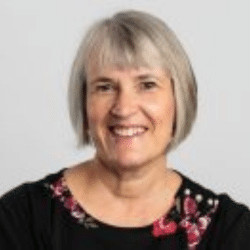
Prof Louise Purton
Women in Hypertension
Professor Louise Purton is internationally recognised for her research delineating the intrinsic and extrinsic regulation of blood cell production in healthy and cancer states. She received the 2022 International Society for Experimental Hematology McCulloch and Till Award for her exceptional research contributions to the field of haematology and stem cells, being the first Australian woman to receive this award.
Louise is also passionate about fostering the career development of the younger researchers and is an advocate for supporting all underrepresented groups in the workplace. In 2021 she founded Equity in Australian STEMM, which is a grassroots organisation comprising academics in Australia. Their advocacy significantly contributed to the recent changes in the NHMRC Investigator Grant funding scheme to improve funding outcomes for women and non-binary applicants. She has also made significant changes to improve the support of underrepresented groups in hematology internationally and received the 2023 International Society for Experimental Hematology Award for Leadership in Diversity, Equity and Inclusivity for her contributions to the field.
Louise has had a profound bilateral hearing impairment since she was a child, and recently became a recipient of two cochlear implants

Dr Saraid Billiards
Women in Hypertension
Dr Saraid Billiards is the CEO of the Association of Australian Medical Research Institutes, the peak body representing medical research institutes across Australia.
Saraid’s career in the health and medical research sector spans more than two decades, with over a decade working in Australia’s largest Government funding agencies – the National Health and Medical Research Council and the Medical Research Future Fund. Previously, Saraid led up Strategy and Engagement for Science in Australia Gender Equity, a transformative program helping Australian academic institutions achieve systemic change for gender equity.
Saraid is a highly regarded leader, policy maker and researcher. She is passionate about health and medical research and advancing gender equality, diversity and inclusion in the sector.
Saraid has a PhD in neurophysiology from Monash University and was a fellow in the Department of Neuropathology, Harvard Medical School.
Possibly add educative video content
The reasons for developing high blood pressure are complex and can include lifestyle (e.g. diet and physical activity), genetic factors, and other medical conditions.
It is IMPORTANT you follow your doctor’s advice. If you are prescribed a medicine to help treat your high blood pressure, it will not cure it, but it will help control your blood pressure. So it is important to take it every day as advised.
